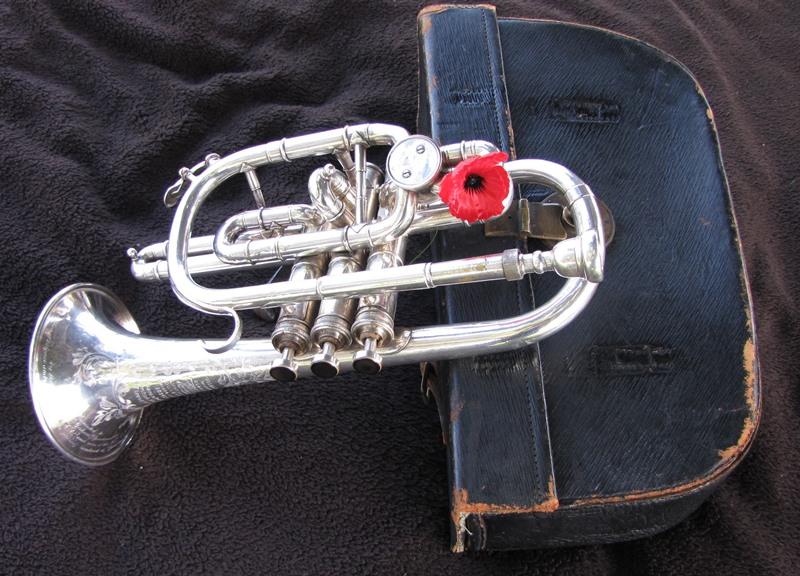'The man who stopped the war'

Ted McMahon in the Boulder City Brass Band in 1910. Photos: Courtesy Kerry Everett
When Sergeant Edward McMahon played The Rosary on his cornet in the foothills of Gallipoli in August 1915, everyone stopped to listen.
Ted, as he was known, was a bandmaster from the West Australian goldfields. He would often play for the troops and was asked to put together a small concert to boost morale ahead of the August offensive – the Allies’ final attempt to seize control of the peninsula.
“On arriving on Gallipoli we found conditions rather tough, and lacking of any amenities for the troops, so naturally it was left to ourselves to make our own way in providing a little relaxation between our spells of duty in the lines,” he wrote.
“I would sit in my dugout in Reserve Gully at night and play my trumpet to the boys with a handkerchief in the bell to drown the sound."
“General [John] Monash, then in command of the Fourth Brigade AIF, sent for me on the afternoon of August 3rd, and asked me to arrange a camp fire concert in Reserve Gully where all the troops … were to be assembled and move out at midnight to start the offensive.
“The Turks were only a few yards away from our trenches on the hills above the Gully, and every round of applause from each item bought a vicious burst of machine-gun and rifle fire.”
Ted chose The Rosary by German composer Ethelbert Nevin which was one of his favourites. The popular tune had been published in German, French, Italian and English, and he knew that anyone who was musical would know it.
“Both our troops and the Turks carried on as usual during the concert with rifle and machine-gun fire,” he later wrote. “[But] the spectacle of thousands of soldiers from all parts of the Empire … lining the sides of the steep hills on both sides and in the gully, to the accompaniment of chattering messengers of death, was indelibly printed on my memory.”

Sergeant Edward McMahon was a bandmaster from the West Australian goldfields.
As the nephew of Hugh McMahon, a famous bandmaster in the West Australia goldfields known as “the Emperor of the cornet”, Ted knew all about the power of music.
"As I started to play, on this beautiful quiet night, when the sound of my trumpet would carry for a considerable distance, a real barrage of small arms fire broke out,” Ted wrote.
“During the second verse, only spasmodic shots could be heard, and as I started to play the final verse, all was still; not a sound could be heard ... only the strains of Ethelbert Nevin’s famous song …
“At the conclusion there was a tremendous outburst of applause from all listeners, including those in the trenches above us, and then everyone settled down to the grim business of war ...
"The charm of the music had cast a spell over all, and for a time the war was forgotten."

Ted McMahon went on to serve on the Western Front and continued to play music after the war.
More than 100 years later, The Rosary was recorded by the Australian War Memorial as part of the Music and the First World War project, which aims to showcase the Memorial’s rich collection of sheet music and concert programs.
The Memorial’s Musical Artist in Residence Christopher Latham said Ted McMahon’s story showed just how important music was during the war.
“Music was performed or sung by the soldiers, often in the most modest and humble circumstances,” Latham said. “It helped to heal the wounds that left no marks, and helped sustain the human spirit in the battlefield. It provided an antidote to the traumas of the day and helped men to recover and to regain their sense of self.”
For the men on Gallipoli, Ted’s music had done just that.

Ted McMahon's cornet. He died in 1970 and the Goldfields Brass Band played at his funeral.
Colonel James Lumsden McKinley spoke of the man he knew as the “Gallipoli Trumpeter” during an oral history interview for the Memorial in the 1970s.
“Every night as the sun used to sink down, he used to play his trumpet,” McKinley said.
“On one occasion I happened to be passing along the canal [trench] just as he was about to play and I thought, ‘I’ll have a look over and see what the Turks are doing.’
“Through a peephole in the side of the thing I noticed the Turks, when he finished, put their hands above the parapets clapping or else belting tins or something to show how much they appreciated our trumpeter playing...”
His rendition of The Rosary on Gallipoli had left a lasting impression on many, including Lieutenant A.J. “Gus” Harris, a bandmaster with the 14th Battalion.

Ted McMahon's cornet.
“There was a dramatic change when Ted stood up and began to play … The Rosary,” he wrote.
“On both sides the men with fingers on triggers heard and paused to listen. The firing faded away until the only sound to be heard was the clear, yearning music of Ted’s cornet.”
Ted went on to serve on the Western Front and was awarded the Meritorious Service Medal for his actions in France, but it was his music that had “soothed the breasts of war-hardened men”.
He later joked to family that he was “the man who stopped the war”, if only briefly.
Claire Hunter is a writer for the Australian War Memorial.